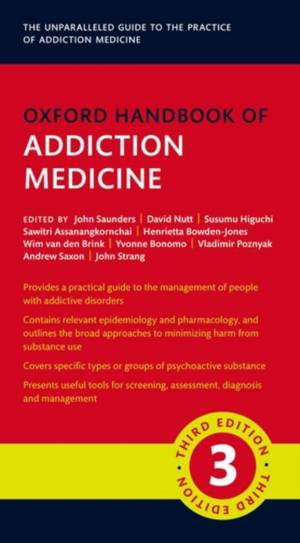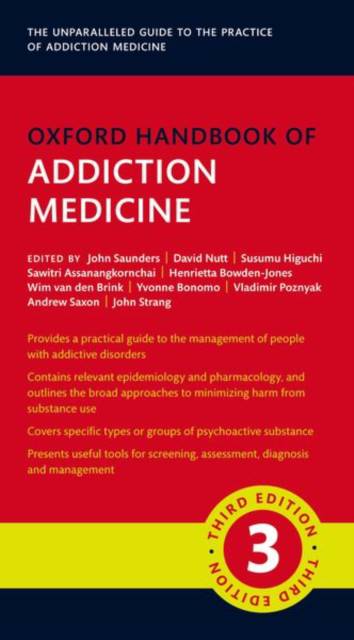
- Afhalen na 1 uur in een winkel met voorraad
- Gratis thuislevering in België vanaf € 30
- Ruim aanbod met 7 miljoen producten
- Afhalen na 1 uur in een winkel met voorraad
- Gratis thuislevering in België vanaf € 30
- Ruim aanbod met 7 miljoen producten
Zoeken
Oxford Handbook of Addiction Medicine
John Saunders, David Nutt, Susumu Higuchi, Sawitri Assanangkornchai, Henrietta Bowden-Jones, Wim Van Den Brink, Yvonne Bonomo, Vladimir Poznyak, Andrew Saxon, John Strang
€ 49,95
+ 99 punten
Omschrijving
Psychoactive substance use ranks among the five top risk factors contributing to the global burden of disease. Substance use disorders can cause, mimic, underlie, or complicate a large number of medical and psychiatric conditions. In recent years, there has been a rapid increase in non-substance forms of addiction such as gambling, internet gaming, and various other behavioural addictions. The ability to diagnose addictive disorders and initiate appropriate management is a responsibility for all health professionals.
Addiction Medicine, now in its third edition and published in the renowned Oxford Medical Handbook series, is the result of many years' preparation by a group of colleagues who are clinicians, teachers, and researchers in the addictive disorders field. The handbook is a contemporary, broadly-based, and clinically grounded text that summarises the scientific basis and practice of addiction medicine. It provides practical guidance on clinical management but with a sound background of pharmacology, neurobiology, psychology, and epidemiology and public health. It seeks to provide approaches to minimising harm from psychoactive substances and addictive behaviours, both at an individual and a societal level.
The new edition has been expanded greatly. In addition to the behavioural addictions, it covers a broader range of psychoactive substances. There are new chapters on Screening and brief interventions and on Digital health approaches. It also continues to be international in scope, with the editors and contributors drawn from over 30 countries worldwide.
The handbook is intended as a concise and practical guide for students, trainees, and qualified practitioners of medicine, nursing, psychology, and other health professionals. In particular, it is designed for students and post-graduate trainees and fellows in addiction medicine, internal medicine, psychiatry, emergency medicine, pain management, gastroenterology, and general medical (family physician) practice. It is also useful and relevant to nurses, particularly those working as specialists in addictive disorders, clinical psychologists, psychologists and counsellors, and social workers and for staff in multidisciplinary agencies which provide help, support, and treatment for people with addictive disorders.
This unparalleled guide contains everything you need to know to assist in the assessment, diagnosis, and clinical management of patients with substance use and related addictive disorders
Addiction Medicine, now in its third edition and published in the renowned Oxford Medical Handbook series, is the result of many years' preparation by a group of colleagues who are clinicians, teachers, and researchers in the addictive disorders field. The handbook is a contemporary, broadly-based, and clinically grounded text that summarises the scientific basis and practice of addiction medicine. It provides practical guidance on clinical management but with a sound background of pharmacology, neurobiology, psychology, and epidemiology and public health. It seeks to provide approaches to minimising harm from psychoactive substances and addictive behaviours, both at an individual and a societal level.
The new edition has been expanded greatly. In addition to the behavioural addictions, it covers a broader range of psychoactive substances. There are new chapters on Screening and brief interventions and on Digital health approaches. It also continues to be international in scope, with the editors and contributors drawn from over 30 countries worldwide.
The handbook is intended as a concise and practical guide for students, trainees, and qualified practitioners of medicine, nursing, psychology, and other health professionals. In particular, it is designed for students and post-graduate trainees and fellows in addiction medicine, internal medicine, psychiatry, emergency medicine, pain management, gastroenterology, and general medical (family physician) practice. It is also useful and relevant to nurses, particularly those working as specialists in addictive disorders, clinical psychologists, psychologists and counsellors, and social workers and for staff in multidisciplinary agencies which provide help, support, and treatment for people with addictive disorders.
This unparalleled guide contains everything you need to know to assist in the assessment, diagnosis, and clinical management of patients with substance use and related addictive disorders
Specificaties
Betrokkenen
- Auteur(s):
- Uitgeverij:
Inhoud
- Aantal bladzijden:
- 864
- Taal:
- Engels
- Reeks:
Eigenschappen
- Productcode (EAN):
- 9780192844088
- Verschijningsdatum:
- 3/12/2024
- Uitvoering:
- Paperback
- Afmetingen:
- 110 mm x 182 mm
- Gewicht:
- 458 g

Alleen bij Standaard Boekhandel
+ 99 punten op je klantenkaart van Standaard Boekhandel
Beoordelingen
We publiceren alleen reviews die voldoen aan de voorwaarden voor reviews. Bekijk onze voorwaarden voor reviews.











